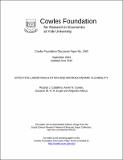Effective labor regulation and microeconomic flexibility
Author(s)
Caballero, Ricardo J.; Cowan, Kevin N.; Engel, Eduardo M. R. A.; Micco, Alejandro
DownloadCaballero_Effective labor.pdf (188.5Kb)
OPEN_ACCESS_POLICY
Open Access Policy
Creative Commons Attribution-Noncommercial-Share Alike
Terms of use
Metadata
Show full item recordAbstract
Microeconomic flexibility is at the core of economic growth in modern market economies because it facilitates the process of creative-destruction. The main reason why this process is not infinitely fast, is the presence of adjustment costs, some of them technological, others institutional. Chief among the latter is labor market regulation. While few economists object to the hypothesis that labor market regulation hinders the process of creative-destruction, its empirical support is limited. In this paper we revisit this hypothesis, using a new sectoral panel for 60 countries and a methodology suitable for such a panel. We find that job security regulation clearly hampers the creative-destruction process, especially in countries where regulations are likely to be enforced. Moving from the 20th to the 80th percentile in job security, in countries with strong rule of law, cuts the annual speed of adjustment to shocks by a third while shaving off about 1% from annual productivity growth. The same movement has negligible effects in countries with weak rule of law.
Date issued
2013-03Department
Massachusetts Institute of Technology. Department of EconomicsJournal
Journal of Development Economics
Publisher
Elsevier
Citation
Caballero, Ricardo J., Kevin N. Cowan, Eduardo M.R.A. Engel, and Alejandro Micco. “Effective labor regulation and microeconomic flexibility.” Journal of Development Economics 101 (March 2013): 92-104.
Version: Author's final manuscript
ISSN
03043878